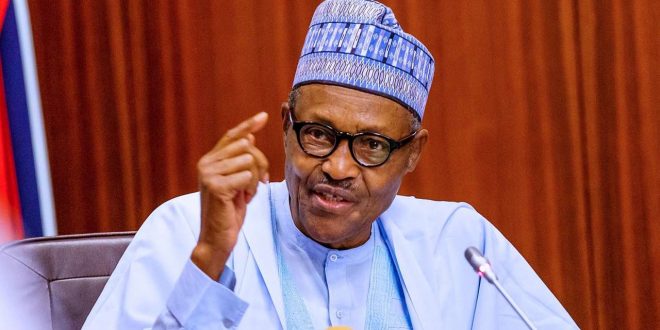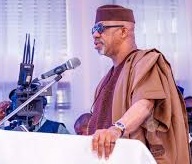ABUJA – President Muhammadu Buhari, has commended the Speaker of the House of Representatives of Nigeria, the Rt. Hon. Femi Gbajabiamila, and other Founding Speakers from Ethiopia, Ghana, Kenya, Rwanda, Senegal and South Africa, for the foresight and vision that birthed this Conference of Speakers and Heads of African Parliaments for African Speakers.
According to a release e-signed and made available to StarTrend Int’l & online – www.startrendinternational.com by Laolu Akande, Senior Special Assistant to the President on Media & Publicity, Office of the Vice President, Vice President Yemi Osinbajo who represented President Buhari at the event stated this on Monday, May 9, 2022.
His words, “Our parliaments, in every sense, are true expressions of democracy. As the largest representative institution in Government and the closest to the people, our parliaments, indeed, ensure a government of the people, for the people and by the people.
“For an institution such as this, the need for strong and visionary leadership is extremely crucial. In this hall today are the voices and desires of the African people; the voice of the average Nigerian far away in Bayelsa State is represented here; the Algerian far away in Constantine; the Rwandan far away in Kigali, or the South African in Johannesburg — all are ably represented here today.”
Bellow is the full text of the speech:
SPEECH BY HIS EXCELLENCY, MUHAMMADU BUHARI, GCFR, PRESIDENT OF THE FEDERAL REPUBLIC OF NIGERIA, DELIVERED BY HIS EXCELLENCY, PROF. YEMI OSINBAJO, SAN, GCON, VICE PRESIDENT OF THE FEDERAL REPUBLIC OF NIGERIA, AT THE INAUGURAL CONFERENCE OF SPEAKERS AND HEADS OF AFRICAN PARLIAMENTS FOR AFRICAN SPEAKERS ON THE 9TH OF MAY, 2022
PROTOCOLS
It is a great pleasure to be here today to witness this historic event, the Inaugural Conference of Speakers and Heads of African Parliaments (CoSAP) for African Speakers, by African Speakers and for the benefit of all Africans.
I bring you warm greetings from our President, Muhammadu Buhari, President of the Federal Republic of Nigeria, who would have been here but had made a previous commitment to an international engagement. He sends his best wishes for successful deliberations here today.
We must commend the Speaker of the House of Representatives of Nigeria, the Rt. Hon. Femi Gbajabiamila, and other Founding Speakers from Ethiopia, Ghana, Kenya, Rwanda, Senegal and South Africa, for the foresight and vision that birthed this conference.
Our parliaments, in every sense, are true expressions of democracy. As the largest representative institution in Government and the closest to the people, our parliaments, indeed, ensure a government of the people, for the people and by the people.
For an institution such as this, the need for strong and visionary leadership is extremely crucial. In this hall today are the voices and desires of the African people; the voice of the average Nigerian far away in Bayelsa State is represented here; the Algerian far away in Constantine; the Rwandan far away in Kigali, or the South African in Johannesburg — all are ably represented here today.
The responsibility to have those voices heard and those desires met is a noble calling to which everyone here is bound.
If there has ever been a time when strong parliamentary leadership is most needed, it is now. This is so, especially because the COVID-19 pandemic has had a widespread effect on economies across the world, destabilizing health systems, upending supply chains, disrupting industries and above all, precious lives have been lost.
The African Continent has fared better than several other continents of the world but was not spared from the pandemic’s scarring effect. Although many African countries have been fairly successful in containing the spread of the virus, the social and economic costs have been high.
The African economy recorded 253,000 deaths and over 30 million jobs lost since the pandemic began. According to the World Bank, the COVID-19 pandemic is estimated to have pushed 26 to 40 million people into extreme poverty on the continent.
Various African countries took decisive measures to contain the spread of the virus and limit its socioeconomic impact. Public health interventions were rolled out, and several programmes and measures were put in place to combat the pandemic, such as lockdowns, stimulus packages, financial support to households and MSMEs, and so on. We all achieved some level of progress with those measures.
In many of our countries, despite relatively weak economic circumstances, the Legislature had to sit down with the Executive to make some of the most breathtaking budgetary provisions in our history. In Nigeria, our stimulus package was in the order of N2.3 trillion (in excess of about $6 billion). In many countries, the implications of the huge deficits from these supplementary budgets must have kept Legislatures and the Executive awake at night, but many realized and performed these hugely risky, but historical assignments because there was absolutely no choice.
But I think it is clear that the post-COVID economic recovery strategy for Africa must go beyond efforts in our individual countries. There is a need for increased collaboration and integration of efforts to drive sustainable economic growth and recovery across the African Continent. Our parliaments have a central role to play. It is to them that the power to enact laws, oversee government budgeting and international borrowing belong. And there are many opportunities for their proactive collaborative intervention.
A crucial concern for all African economies is how to improve liquidity, reduce the debt burden and improve our balance of payments positions, especially in the wake of the huge damage done to our finances by the pandemic.
Indeed, one of the key issues discussed and agreed to at the preparatory meeting for this inaugural meeting was debt cancellation for African countries. This initiative is already gaining considerable traction.
A practical initiative introduced in the immediate aftermath of COVID-19 was the new SDR (Special Drawing Rights) reallocation of $650billion, which was implemented in August 2021. There are arguments around how much of it the African Continent and developing economies got. I think it is important to recognise that it was a lifesaver for us and it came at a very strategic moment.
The allocation improved our balance of payments position by increasing the share of SDRs in the reserve assets of our countries; thereby providing direct liquidity without raising our debt burdens. This was an important consideration for us all at the time, we needed the liquidity and couldn’t go borrowing anymore. I think that African countries speaking in one voice can seek more SDR support.
The Economic Commission for Africa, ECA, recently proposed that our countries could address our development financing needs by leveraging SDR reallocation through on-lending vehicles, such as the Liquidity and Sustainability Facility (LSF), a trust for middle-income countries, multilateral and regional development banks, as well as the Poverty Reduction and Growth Trust (PRGT). And that these arrangements could, in fact, provide an appropriate window for financing development and global public goods.
The pandemic exposed the vulnerability of our healthcare system and has shown how interconnected and interdependent we all are as a continent. Since one country is not excluded from the health crises that plague another, we must collectively invest in our health systems, rapid response and emergency management structures, so that we are better prepared to handle future pandemics if they arise.
Vaccination is key to sustainable post-COVID recovery. However, Africa has lagged behind so far compared to the rest of the world, with only 16% of the continent’s population fully vaccinated.
As much as the global vaccine inequity remains a cause for concern, a greater call beckons – the need to free the African Continent from external dependencies. We cannot guarantee the health security of the African people with our current level of dependency.
The time has come for Africa to start producing the vaccines she requires, and this is not a feat that can be achieved in isolation. It must be a collective push. Legislation must be put in place across the continent to further strengthen research and development capacity, harmonize drug registration regulations, and build world-class pharmaceutical industries. As we had noted earlier, SDR reallocation along the lines suggested by the ECA could release development finance facilities for the creation of more than one vaccine facility in Africa. We have a unique opportunity to be able to finance, relatively cheaply, our vaccine facility.
Africa’s post-COVID economic recovery trajectory must also include increased social protection for all. This is important because of the levels of poverty we have.
The pandemic revealed the importance of social protection schemes in responding to a wide range of economic shocks, as most African governments implemented various social safety nets to protect the poor and most vulnerable from the very major socioeconomic impacts of the pandemic.
Going forward post-COVID, we must leverage this experience and drive progress towards more inclusive, effective and equitable social protection systems. Social protection programmes are expensive, and they are often the subject of ideological type arguments. But social protection is no longer a left-leaning idea or socialist idea. It has become fundamental to economic development. There is no conflict between free markets and social welfare programmes, especially those that enhance the capacity of the poor and vulnerable to access better opportunities and a better life.
I think that our legislatures need champions for social development programmes.
The COVID-19 experience reiterates the need to leverage technology in building stronger delivery systems for wider coverage towards protection for all. Our legislation across the continent must be designed to support technology and technology innovation.
We have seen in Nigeria the rapid growth of FinTech companies. Since 2015, there are now 7 Nigerian tech companies valued at over a billion dollars each. Many of our countries are also seeing the rise of these companies, and some are licensed in our different countries, but we must look for continent-wide legislation that makes the work and reach of these companies easier. You’d find that they are able to provide several well-paying jobs for our young people. It is an important time for our legislatures to react to what we are seeing – phenomenal growth in tech companies and innovation in Africa. This is the way that we can all leverage technology to leapfrog in our development and economic recovery efforts.
Hon. Speakers, Africa’s post-COVID recovery must leverage the African Continental Free Trade Area (AfCFTA). The AfCFTA is a unique opportunity to consolidate Africa’s enormously large market, which will create and recover millions of jobs, reduce Africa’s import dependency, boost intra-Africa trade and exports; and strengthen intra-Africa cross-border ties and trade relations.
The opportunities are simply mind-boggling, but they will involve the magic word – collaboration!
Recently, Afrexim and the AfCFTA secretariat, working jointly, launched the Pan-African Payment and Settlement System (PAPSS) which provides a robust financial market infrastructure connecting African markets to each other. The system enables instant cross-border payments in the respective local African currencies. This is a big boost for cross-border trade and will save African economies almost $5 billion annually.
Afrexim Bank, as the main settlement agent for PAPSS, provides settlement guarantees on the payment system and overdraft facilities to all settlement agents, in partnership with Africa’s participating Central Banks. PAPSS will effectively eliminate Africa’s financial borders, formalise and integrate Africa’s payment systems, and simply make trade within Africa using local currencies easier.
This is the way to go. Domestic legislation will be required as time goes on, and we must anticipate and be prepared to act on these promptly.
The pandemic also induced serious challenges of food insecurity. Food inflation is now expected to rise above 12.2% this year. The pandemic also revealed the importance of retaining trade ties and ensuring minimal food chain disruptions. As a continent, we must maintain open and efficient cross-border supply networks for agricultural inputs. This will allow for robust value chains that connect domestic and regional markets.
The agricultural sector is key to the overall productivity of the African economy. It is 23% of the continent’s Gross Domestic Product (GDP).
We must improve our agricultural productivity; we must produce our own food and reduce import dependency for key commodities. The conflict in Ukraine has shown us very clearly that we cannot continue to be dependent on other countries, especially for grain that can be grown locally.
Once again, Africa’s parliamentary leadership must partner with the executive arm of government, the private sector and other stakeholders to design and implement frameworks to support the agricultural sector in tackling food insecurity on the continent.
Truly, the journey to a sustainable post-COVID economic recovery is laden with so much responsibility for our governments. All hands must be on deck to ensure that Africa rises from the impact of the pandemic to even greater heights.
We must build strong collaborative partnerships across the aisles in our parliaments, with our Judiciaries, the Executive and the private sector and civil society. If we learnt anything from COVID and its aftermath, it is that no nation, institution or group can succeed alone. Collaboration is key.
Therefore, let us leave this conference, not having merely rehashed the continent’s problems, we should agree on some clear-cut solutions and, perhaps, even make a few pragmatic decisions on how to go forward, even if only around a few of those issues we will be discussing today, to resolve and collectively execute and drive the next phase of Africa’s economic growth and development.
We mustn’t miss the opportunity of so many African Parliamentarians gathered today and so much experience from across the continent. It is a golden opportunity to do a lot of good work. I look forward with anticipation to receiving the outcomes of this conference.
It is now my special privilege and pleasure to formally declare open the 1st Conference of Speakers and Heads of African Parliaments (CoSAP).
Thank you very much for listening.”
 Startrend International Magazine For Your Latest News And Entertainment Gists
Startrend International Magazine For Your Latest News And Entertainment Gists





